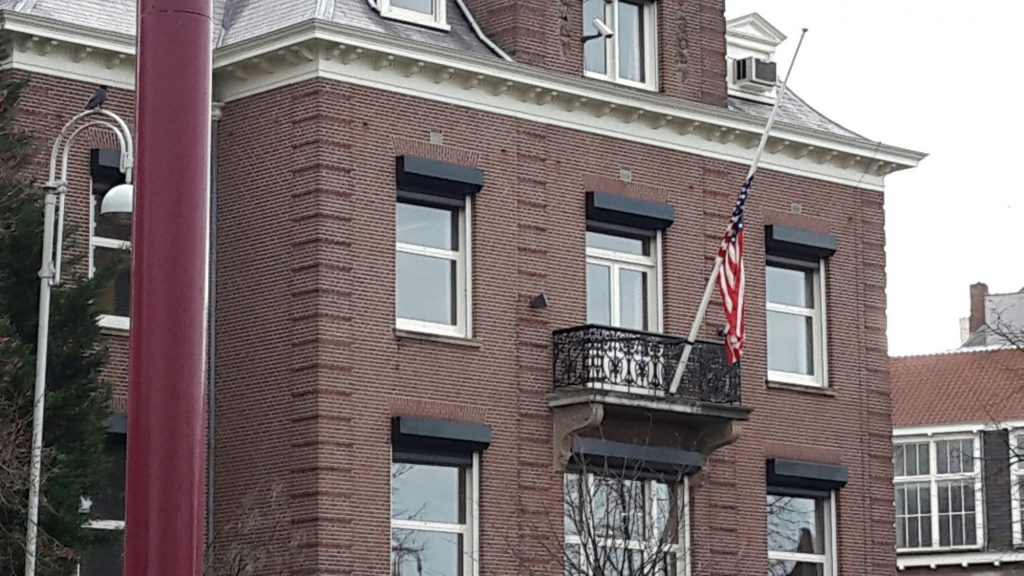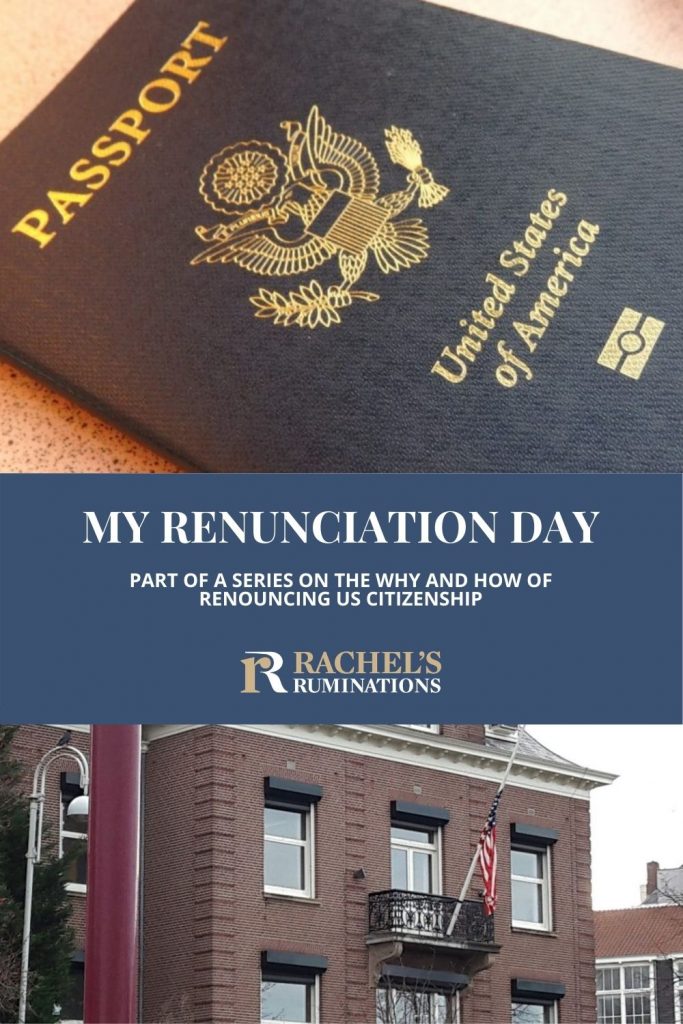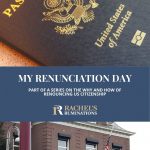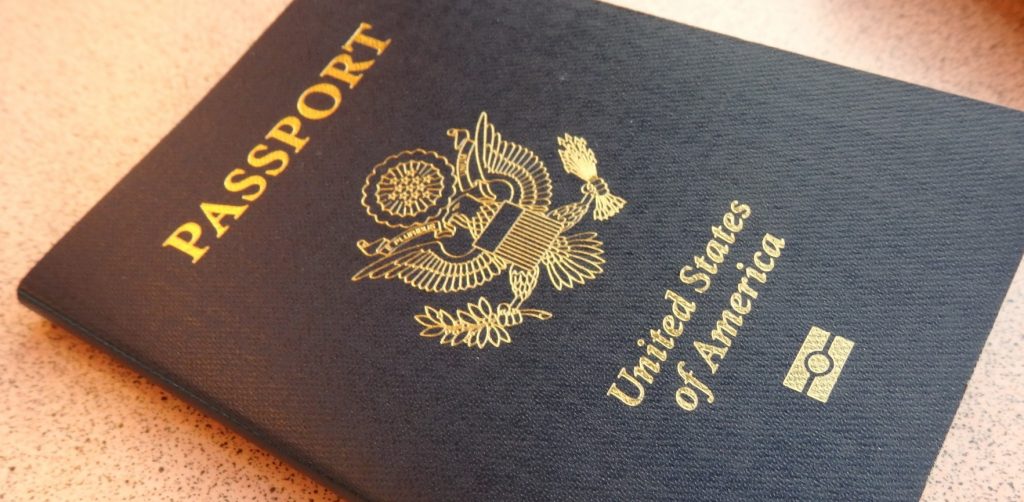My Renunciation Day
I renounced my US citizenship today.
Right now, I don’t want to discuss the politics, but rather just let you know what my day was like.
Note: This article was published on November 18, 2015.
Getting there
Like any good Dutch resident, I got to Amsterdam by first riding my bike to the train station here in Groningen. I waited for the train, which was a bit late.

The ride to Amsterdam takes a bit more than two hours. In the early morning light, the passing scenery was lovely.
I read the free paper I had picked up at the station. The articles screaming about the Paris attacks made my private grief about renouncing seem pretty unimportant by comparison.

In Amsterdam
Outside the Amsterdam train station, a camera crew waited. Without getting into specifics, I’m going to be featured in a piece at some later date addressing the issue of the increasing number of Americans who are renouncing their citizenship. Because of the Paris attacks, the team putting the report together are in Paris, so today wasn’t the full interview. This camera crew was there to film me before and after my actual renunciation and the interview itself will happen at a later date.
I spent some time being filmed by them, both at the train station and outside the consulate.
Note added in June 2021: The segment, on a major US news show, never happened because of all the attention to the terrorist attack. They kept telling me they’d come back to it, but never did. It’s too bad, because the situation that caused me to renounce in 2015 is still just as harmful to Americans abroad today. The publicity would have helped.
Renunciation at the US Consulate
At my appointment time, I entered the consulate, passing through the usual security: no electronic devices allowed, no bag allowed, just the necessary papers and wallet. I was not allowed a camera, so I have no pictures of the renunciation itself.

Three other visitors had appointments besides me. A young couple with a newborn were either registering their child or getting the child a passport. I couldn’t hear well enough to know. The other was a young man who was renouncing like me, but seemed much less upset about it than I was feeling.
When it was my turn, I went up to the window and a very nice man asked for my passports. I handed them to him and burst into tears. He was very kind about it, saying that he understood, and repeating that I didn’t have to renounce, that I could still change my mind. When I pulled myself together, I told him that I wanted to renounce, I just wasn’t happy about it.
In addition to my passport, I handed him an article I’ve written about why I’m renouncing. The renunciation process allows me to include a statement along with my papers, and I decided to hand this in as my statement. You can read it on Medium.
A short wait and it was time to pay. Farewell, $2350! That’s what the US charges to renounce citizenship.
Another short wait, and I was called up for the renunciation itself. I signed a form in duplicate called “Statement of Understanding Concerning the Consequences and Ramifications of Renunciation or Relinquishment of U.S. Nationality.“
Next I took an oath which the man behind the counter read to me. It basically stated that I understood all the ramifications and that I was not being coerced in any way. I signed a paper version of it in duplicate as well.
The man who swore me in told me that while I was waiting, he and his colleague had read my article and thought it was good: clearly stating my reasons for renouncing. He said it would be sent with my application to renounce and because I had clearly thought this through, he would recommend that the State Department allow my renunciation. I was surprised at his kindness, and that of his colleague, who also said positive things about what I had written. I had entered the consulate fearing that their attitude would be nasty: that they’d treat me as some sort of traitor. It was a relief that the process was so gentle.
I was also surprised that I had to have State Department permission to renounce. What happens if they say no?
Afterwards
So now I wait. In “a few months” I should get a Certificate of Loss of Nationality in the mail, along with my cancelled passport. In the meantime, I’m still a US citizen.
Leaving the consulate, the camera crew filmed me some more and then we parted ways. To clear my thoughts and cheer myself up, I took a long walk back to the train station along the Prinsengracht, looking at the beautiful old buildings and snapping pictures.

That was it: onto the train at Amsterdam Central. Back to Groningen and on my bike home. It’s evening now and I’m exhausted: both mentally and physically, given how little I slept last night, and how fraught this whole thing has been for me. I’ll post more about this in the future, but right now I’m off to bed.
My whole US citizenship series:
- Part 1: Giving up US citizenship?
- Part 2: Republicans, expatriates, and FATCA
- Part 3: How my citizenship hit me in the gut
- Part 4: My renunciation day
- Part 5: Thanksgiving reconsidered
- Part 6: FATCA, the Tea Party, and me
- Part 7: Individual freedom, self-reliance and renunciation
- Part 8: Equality? Competition? Not overseas!
- Part 9: The American Dream
- Part 10: The irony of renouncing under duress
- Part 11: Open letter to President Obama in response to the State of the Union Address
- Part 12: 7 Reasons NOT to renounce
- Part 13: Citizenship matters
- Part 14: Citizen of a parallel world
- Part 15: Renunciations in the news
- Part 16: Vote … as a non-citizen? Really?
- Part 17: The ridiculous story of a pilot and his taxes
- Part 18: On receiving my Certificate of Loss of Nationality
- Part 19: So you think you want to emigrate…
- Part 20: Indignation Fatigue and FATCA
- Part 21: The US election, as seen by Americans overseas
- Part 22: On receiving my California voter ballot
- Part 23: Watching America fall apart on my renunciation anniversary

Article updated June 2021.









I totally feel your pain. It’s very sad that it came to this for you.
Thanks, Caroline!
Wow Rach!
What a big day… I hope you’re doing well.
Can’t wait to hopefully see that letter published somewhere!
I’m fine now after finally getting a full Night’s sleep! I’ll let everyone know when the article gets published!
Wow! I’m sure it was exhausting. I couldn’t renounce – too much of my identity is wrapped up growing up American. So I just pay the taxes.
If you’re paying taxes to the US as well as where you live, you earn over the exemption and you’re essentially paying double taxes. Doesn’t the unfairness of that make you furious?
Even if you’re over the limit for the exclusion, you should be able to take a foreign tax credit against any income tax you pay to the other country. If their tax rate is equal to or greater than the U.S.’s you still shouldn’t owe any tax to the U.S. (now if the foreign country’s tax rate is lower then you will have to pay the difference, or the full amount on the non-excludable income if the other country has no income tax at all).
I guess it depends on the country you’re in and what the differences are between the two systems. In some countries you end up double taxed, e.g. capital gains. In any case, taxes aren’t the main reason I renounced (I’ll never be over the limit for the exclusion.) It was more about feeling that the US is invading my privacy (FBAR) and treating me like a suspected criminal. And the fact that we don’t have representation. And the fact that the forms are so outrageously complicated that I have to pay an accountant to fill them in for me.
@Kelly, the foreign “earned” income exclusion is just that, for earned income. All unearned income is taxable to the U.S. even when your country of residence does not tax it. A short list of what this includes are disability payments to yourself or your accidental American child, unemployment income, many sorts of retirement savings, etc. etc. In some cases it means your foreign spouse and child will end up being taxed by the U.S. for the honor of having an American in the household when if you were not part of the family they would not be subjected to such. In fact were they married to a foreign spouse from any other nation in the entire would they could live as they normally would as a citizen of their country of birth. The FEIE does not work to exempt you or family members who are accidentals in many cases penalizing those who are out of work, disabled etc. My own accidental son was going to be taxed by the U.S. on money he got from the Canadian government to go to college, even though he was born here and has never lived a single day in the U.S.
I know some who really think that Foreign earned income exclusion is quite a good deal and I suppose if you are only working abroad for a little while say five years, it might work for you but,if you have foreign family dragged into this or you are a long term expat then no way does that help you much at all.
Thanks for explaining that, Ruth! I’m sure that short-term expats wouldn’t feel the burden nearly as much, though they might have trouble banking while they were overseas, since more and more banks are refusing to do business with Americans.
As I said if the other country taxes those as income you can use the Foreign Tax Credit to not be “double taxed” regardless of the source or amount of income (with very limited exceptions). Of course it will completely negate your U.S. tax liability only if the other country taxes it at an equal or greater rate (and if the other country doesn’t tax it at all then you will have to pay the full U.S. rate), and it’s a little harder to figure than the simpler FEIE, but don’t forget both options to help relieve your expat tax. There are only a few cases where you’d be truly “double taxed” and have to pay BOTH the U.S. and foreign country’s rate.
I’m not trying to downplay the many concerns that expats have, but the way you posted you were acting that only the FEIE and not the FTC existed.
I had to learn all this while trying against all odds to figure a way to keep my citizenship with the U.S. All my family are there, I was born and raised there. Unfortunately, the more I learned the more I knew what a huge burden I was going to be to both my son and my husband here in Canada. For example. My spouse has paid for nearly all of our primary residence. If we sold our home the U.S. would try to claim capital gains on my part of the home. If I take my name off everything to protect my Canadian spouse and chile then I am a pauper on paper and if something should happen to my spouse I am in quite a situation. A situation not many could bear if they are lower income.
The irony is that FATCA was supposed to harm fatcat tax cheats and in fact they are all gone to very expensive international tax lawyers and the rest of us are being thrown under the bus.
There is no good solution because now I cannot move home in my elder years to live near my siblings but, the alternative was worse. Congress doesn’t seem to want to fix these issues. I relinquished before the fee to do so went sky high as I could see the writing on the wall that they would raise the fee and there are two of us in the household that needed to renounce. One being my son who stil insists that it is ludicrous that he should consider himself “American” having not been born there nor lived there at all.
You know the dril though, Rachell I am sure. Btw, my relinquishment was back dated to 2012 and I am still not on the “name and shame” list. I think those lists are fudged as the line up to renounce in Toronto alone is longer than the entire published list.
@Kelly, it’s not so much about being double taxed. Why should the U.S. tax disability savings income away from a Canadian who has paid into it along with matching funds from the Canadian government. No it’s not taxed here as Canada figures someone on a minimal disability or unemployment income should not be taxed. In such cases the U.S. is actually taxing other countries governments who have tried to support their unemployed or disabiled residence and citizens. There are many, many cases where such situations hold true.
FEIE is okay if you have no family ties in your country of residence, won’t be there long enough to have savings or property with a foreign spouse and do not have foreign born children. Otherwise, it’s impossible to save, bank and live as any other law abiding person would in the country where they live. Seniors are especially hit hard by not being able to use FEIE and so are students who are accidentals.
Thanks for sharing. In a little less than two weeks I’ll likely be facing the same people. Good to read that they were “nice” about it. Were you able to leave your phone and such at their reception desk/guard? I hate travelling without my phone.
I had this film crew with me, so they took my phone and other electronics while I went inside. If you’re talking about the consulate in Amsterdam, what I did last time I had to go there was go across the Museumplein to the Stedelijk Museum. They have lockers in their lobby, near the desk where you can rent audio guides. I just used one of the lockers; no one stopped me.
Good idea. Are the lockers before the ticket desk?
There’s an open space with reception desks at both sides, but the lockers are to the right past one of them. It’s before they actually check tickets, though, so you don’t have to pay. Just walk to the lockers and back out again.
I admire your courage. I would be curious to know a bit more about the “back story” of why you decided to renounce.
My reasons for renouncing are several, and I wrote them out in my article. I promise to let everyone know when that gets published and turns up on-line!
Rachel:
Congratulations for taking this difficult step. Thank you for your willingness to be interviewed and to write about this experience. Your writing and interview will help raise awareness of the reality of what the U.S. Government is doing to Americans abroad. To put it simply: Americans abroad are being forced – by the laws enacted by Congress and the enforcement of these laws by the Obama administration – to renounce their U.S. citizenship.
The specific reasons for this are discussed day in and day out on blogs, Facebook groups and pages, Twitter handles, and more. So, I won’t repeat them here.
The 14th Amendment of the U.S. Constitution, as interpreted by the Supreme Court of the United States, in the cases of Afroyim v. Rusk and Vance v. Terrazas make it clear (as per Justice Black in Afroyim) that:
“Citizenship in this Nation is a part of a co-operative affair. Its citizenry is the country and the country is its citizenry. The very nature of our free government makes it completely incongruous to have a rule of law under which a group of citizens temporarily in office can deprive another group of citizens of their citizenship. We hold that the Fourteenth Amendment was designed to, and does, protect every citizen of this Nation against a congressional forcible destruction of his citizenship, whatever his creed, color, or race. Our holding does no more than to give to this citizen that which is his own, a constitutional right to remain a citizen in a free country unless he voluntarily relinquishes that citizenship.”
The time has come to use the courts to remind the U.S. Government that:
“Its citizenry is the country and the country is its citizenry.”
The U.S. Government cannot engage in laws and policies that are “forcing Americans abroad to renounce THEIR U.S. citizenship.
Rachel, I admire your common sense, courage and generosity in sharing. Americans abroad owe you a great debt for having the courage to write about this experience.
And rubbing salt into the wound is that fact that they charge us so much for something that we’re essentially forced to do! Thanks for your kind words, John!
@Rachel, @John
“Next I took an oath which the man behind the counter read to me. It basically stated that I understood all the ramifications and that I was not being coerced in any way. I signed a paper version of it in duplicate as well.”
The State Department is turning a blind eye to the fact that CBT and FATCA are driving the recent tsunami of renunciations and documentation of relinquishments. Ex-pats are literally being taxed out of their US citizenship– how can they claim the relinquishments are voluntary?
For the record, I am an “undocumented relinquisher.” I was born and raised in Boston, but have lived outside the US since 1993. I now travel to the US on my Canadian passport. I feel this action was forced upon me by FATCA and CBT. I am angry and resentful that I was forced to give up my “right of return” to the country where I was born and raised.
John, thank you for articulating so well what is driving all these renunciations in your comment above.
Rachel, thank you for blogging your story and agreeing to be interviewed and filmed. I look forward to watching the segment and reading the statement you submitted once it’s published.
All the best,
BC Doc
Crossing the border on your Canadian passport is risky, isn’t it? Can’t they stop you from crossing since you’re required to use your US passport?
I guess it depends on your definition of “coerced.” Their assumption seems to be that none of us intend to stay overseas. If I was just a temporary expat on a two-year assignment for a job, for example, it wouldn’t seem nearly as much like I was being persecuted.
I became Canadian in 2001. My position is that I relinquished my USC when I became Canadian. At that time, there was no requirement to notify the State Department of the relinquishment. I’ve entered the US maybe a half a dozen times on my Canadian passport and only once had a US customs agent ask me about my US place of birth– he was quite reasonable when I explained why I was travelling on a Canadian passport.
After living here for so many years, Canada is home. I attended medical school here, have worked here, raised a family, and made my life here. The US at this point feels pretty foreign to me. Canada is where I choose to be.
That said, I believe CBT with FATCA as the enforcement arm, is a huge human rights issue for US expats. The UN Universal Declaration of Human Rights, of which the US is a signatory, list right of return as a basic human right. CBT and FATCA have forced thousands of us to give up that right.
The amazing thing is, the US government have been fully informed of the problems this is causing, yet Congress seem to think it’s acceptable to wait for comprehensive tax reforms, hold Congressional hearings so that can showboat for their Homelander constituents, and otherwise just do nothing. The Republicans put as a plank in their party platform for the 2014 elections to repeal citizenship-based taxation and FATCA. They hold majority positions in both chambers of Congress, yet they’ve done nothing.
There’s an even bigger issue with FATCA, CBT, and other forms of US regulatory overreach. Quite apart from the many, many unfortunate situations where US and country of residence laws just don’t line up, foreign emplyers, business partners, and other engrepreneurs have become gunshy of having anything to do with Americans, simply because they know that if they do, for example, work for a foreign company, then if the American employee fails to report taxes, they have a problem. But even if the American does report taxes, the fact that their company name goes every year to the IRS on the employee’s tax return is enough to make them afraid of prosecution. This is, of course, in most cases a ridiculous fear, but the employer spends enough time keeping abreast of the regulations of the company of their incorporation. They don’t really have time to keep abreast of US regulations as well.
I’ve seen rather comical cases of Swiss banks with American customers who wanted to keep their bank accounts requiring the American customers to hand over their US tax returns to the bank for review. The bank would then overzealously comb through any deposits, and try to find reasons to report the customer to the IRS, even when the deposits were not tax relevant.
The only solution that gives Americans and American any hope of competing in the world (apart from government-sponsored dirty tricks and costly military intervention) is to make it so that, if an American lives outside the US, there is not US regulatory interference, and most certainly not any interference that requires that service providers to such Americans engage in costly oversight activity which is not reimbursed (such as FATCA). Same-country exclusiions to FATCA still require banks to track US citizens in case they move out of their country of residence.
FATCA as a tool to combat wealthy Homelanders who hide money overseas is an OK concept, but it was just implemented in a very poorly thought-through, destructive way for Americans abroad.
Those inclined to defend mediocrity are always quick to quip that the only thing that affected Americans need to do to solve their problems is move back home. Apart from those who can’t move back home for family reasons, the US have high unemployment and many unresolved social problems. I’ve been on the lookout for a job in the US for over a year now, but US employers are not apt to hire someone with foreign work experience. Many HR people are even dumb enough to think that, because I live abroad, I need visa sponsorship to work in the US. I always check the ‘no’ box, but they tend to take non-qualified people who are local over extremely qualified people from abroad.
So to summarize: the main reason to implement RBT is to save Americans abroad from the stupidity of bureaucrats and the powerful in both the US and abroad. But those in power don’t like to admit that people (including they) can really have been so stupid, so they just hunker down, do nothing, and hope that the US corporate media will wash the problem from US homelander conscience with the report of the 306th mass shooting of the year.
Yep. I think it’s also easy for the Republicans to bargain away because our votes don’t count. Why stand up for us if we can’t vote them out? All the Democrats would have to do is say “Look at him, he supports tax cheats!” if a Republican isn’t willing to bargain residence-based taxation away. (By the way, sorry this took so long to approve and respond: it ended up in my spam box for some reason.)
I would love to know your thoughts/feelings as you walked along the Prinsengracht.
Very scattered. I don’t live in Amsterdam, so I tend to approach it like a tourist, enjoying the scenery. It was weird to think that that beautiful place is now MY country … I mean, it already was, since I’ve had Dutch citizenship for years, but walking through it, still feeling like a tourist … hard to express how I felt… somewhere along the walk was when I decided to write this post and started composing it in my head.
Hi Rachel,
Thank you for your posts. I just discovered your blog, and I identify with your words.
I am an American currently struggling with the fact that I might have to renounce. I have a foreign spouse (no greencard) and have lived in Europe for 10 years. I don’t have a second passport yet but will be allowed to apply in 1-2 years.
I like living in Europe, and I have lived in 5 countries over the last 10 years. At the same time, I was born and raised in the US. It is a part of my identity.
I have sleepless nights and stomach aches thinking about this. My emotions swing back and forth like a pendulum, between anger and sadness. The only sentence that keeps running through my mind is, “I don’t want to to be forced to choose between my identity and my (and my husband’s) financial security.” But, I think in a couple years after I can get my other passport, I will have to make that choice.
Some people in the world are forced to make these kinds of difficult personal choices because of genuine tragedies – wars, natural disasters, etc. It is a shame and a disgrace that the alleged “force for democracy” in the world is, in fact, forcing its own citizens out due to misinformation, unsubstantiated beliefs, and willful ignorance of the consequences of its actions. (The Taxpayer Advocate has urged Congress to study the actual versus intended impact of its laws on Americans abroad…to no avail.)
I am happy you gave an interview. I will most certainly keep my eyes open for when it is released. I hope it sheds light on the millions of us “average” Americans who are being unduly penalized and criminalized for where we live, or rather…where we do not live.
In a way, you’re in a good position. You have to wait a year or two to renounce anyway, and you might not need to. The issue seems to finally be on the radar, so maybe the laws will be changed by the time you can make the decision. I completely understand the sleepless nights, etc. I went through the same thing. Good luck to you!
Hello Rachel,
I think it’s high time we actually “meet” I am AtticusinCanada but, my name is Ruth Freeborn. I’ve had my renunciation story in the media several times and like you as you may have guessed I was very torn up about it. I still am, I suppose it’s not one of those things you “get over” As you also know I didn’t feel I had any choice. If I had a choice, I’d still be American.
The recent misguided fall out from FATCA hit my family way too hard for me to remain American. I am very sorry every time I hear another one of us has come to the same sorry conclusion. I’m more sorry this time though because having read your previous writing I know that you struggled with this the same as I did. I held out a secret hope that you’d be able to hang on when many others could not. The situation has become so unworkable for so many.
At any rate I’m not happy to hear you’ve renounced yesterday but, I do feel enormous empathy for the process you had to go through in order to make that final decision. State department officers were exceedingly kind to me in Toronto as well, and I too became emotional. One of my friends was so distraught at her appointment the officer actually said to her “That’s okay, you’ll always be American to me” There’s something very, very wrong here. State has to do what they have to do but, I feel they do see how off the rails this has all gone. I’m not sure that helps a lot but, it does make it easier to endure the appointments.
Yesterday will stick with you in many ways. There’s nothing I can do or say to change that but, I can be supportive and will do. Anytime. Find me on FB if you like.
Thank you so much for your kind, supportive words! It really helps that I’ve been getting such positive feedback here, on FB and twitter, and at the consulate as well. I was so afraid that Americans would judge me as some sort of traitor, but I haven’t had that kind of reaction yet at all.People keep assuring me that I’ll always be American to them. And Thanksgiving will go on as usual, turkey and all!
You expected to be treated as an American yet faced increasingly burdensome, unfair, discriminatory, and unAmerican laws, perpetrated by the US Government, against your rights to liberty, property, and the pursuit of happiness.
Yes, exactly. And I do expect that this will eventually change, but just for practical reasons I can’t wait that long.
I would reall like to hear more about your reasons for giving up your US citizenship. The article only mentioned that you were full of emotions and that you had support around you. Which is definayely awesome on it’s own and congratulations! ☺ But now I am left wanting to hear more. It’s like a preview to a movie but the movie will never come out. My husband and I just immigrated to Australia Sept. 11th this year with our two children and this is a subject we are considering down the rd. before the kids finish school. Please share more!
Some of my reasons are mentioned in the three previous posts I linked to right at the beginning of this post. I want my article, though, to reach a bigger homeland American audience, so I don’t want to publish it here yet. After it’s published there, I’ll republish it here.
It’s interesting to read your post since my Polish roommate just got her citizenship and told me about how this year has been the most of American citizens renouncing their citizenship. I’m intrigued to read more of your thoughts and I’ve often had these inclinations myself.
It will be far more next year. Many who want to renounce haven’t done it yet because either a) they didn’t know they had to file taxes from overseas if their income was under the exemption and they are paying taxes where they live. You have to get tax compliant before you renounce, and that takes time. Or b) They can’t afford the $2350 fee the US charges for renunciation. It’s ironic, isn’t it, that we’re doing this while so many, like your roommate, want US citizenship. Many, perhaps most, of those renouncing don’t really want to give it up.
Like you, I find it ironic like you do that so many want to come to the United States and become a citizen, when there are just as many American-born citizens who can no longer take what is happening in this country and want to leave. I have and still consider leaving and determining where to go next internationally and want to become a citizen of a different country just as much as my Polish roommate wants to stay and live in America. It’s an interesting situation and although I’m hopeful at times that things in the United States will change, I also see how backwards we are too and that makes it hard to believe sometimes.
Much as I disagree with much that is happening in the US, I didn’t renounce to reject the US. I disagree with things happening here sometimes too. That would be true in any country. I renounced because I have decided to stay here in Holland but that is not possible in a practical sense under #FATCA. And I renounced reluctantly because, despite all its faults, I still love the US and still feel like an American.
Oh, I guess this is the update I asked about in my earlier comment. You have written the story of your day so beautifully that I felt like I was there on the bike and train with you. The entry procedures into the consulate sound much like a time I visited a Women’s prison (for work) and had to leave belongings locked up before entering. Glad those assisting you were kind. Hope as your future unfolds that this will become one of life’s tender memories and nothing more~
Thanks, Jackie. All of the kind reactions I’ve been receiving really help!
I can’t wait to read your article. Here in Norway where dual citizenship isn’t allowed you can get a waiver to renounce your citizenship when you want Norwegian citizenship because of the fee. It is a shame it costs so much.
I am considering renouncing my citizenship (when I have the opportunity to become a Norwegian citizenship) because of the same reasons. This is the first time my husband and I have had separate accounts but it is the best for us currently. He surrendered his Green Card voluntary so he wouldn’t have to file taxes and fill out the paperwork.
It is crazy. The banks in the states are dropping people overseas and the bank in Europe are dropping those in their countries with US citizenship.
Hopefully something will change soon!
Yes, we’re screwed either way. And it’ll get worse, I fear, before it gets better.
I have just paid close to $1000 to have accountants bring me up to speed with requirements as an American abroad needs to do to remain an American citizen.
Not only do I have to provide the IRS with a tax return every year, but I have to report Fbars which show all movement of funds from Isis (tax free accounts), pension funds, bank accounts etc… It is not only onerous , it is expensive. If you do not get it right, you will be fined. I pay taxes here in England. I receive no services from the USA.
I was charged $582 for the ACA for my 16 year old daughter and had to alert the accountant to correct the avaricious IRS’s mistake that she should be exempt. They were wrong, but they tried! If I was wrong, I would be penalised and had to pay more money in penalties! I have a hunch the US Government will not grant exemptions in the future and all Americans abroad will have to pay to subsidise Americans for their health care. I do not have health care insurance nor do I need to receive health care in the USA! This is tyranny.
I read that Americans caught up in the recent Paris attack (a young couple with their baby) ran to the American Embassy in Paris for safe haven and were turned away.The had to take the subway home in Paris while they were terrified of the events going on around them. What do we get as Americans abroad?
Why are we taxed on top of what we pay to our host nation?
I love the USA where I was born and grew up and paid taxes until I moved to my spouses country with my children? When and if I move back there I will pay taxes for the services I receive, but in the mean time, I feel being forced to file tax returns and pay any tax is wrong when I do not receive protection or any service from the USA.
Exactly why I renounced. It’s all based on the US’s insistence on citizenship-based taxation rather than the policy of residence-based taxation that most other countries follow. That has to change for the situation to get any better. I decided not to wait.
What are people saying around you where you live?
Here Canadians affected and unaffected directly are furious and see the U.S as a huge bully. In the U.S. press they keep saying how all these nations signed an “agreement” That’s not entirely true. They signed upon threat of sanctions. They had no choice. In Canada there was a feverish debate in Parliament and it’s likely not even legal here but, Canada had no choice in the matter or they would never have signed on. What’s even more interesting is that the U.S. promised reciprocity which they are not going to give. Even though most nations only tax on residency *not citizenship* so they are not entirely interested in what their citizens abroad have in their bank accounts.
Most of my Canadian friends think the U.S. has lost it’s mind treating low and middle income expat families and Canada in this manner. The Green Party, Liberal Party, NDP and even the Cons were all against this so called “agreement” We didn’t have a choice.
That doesn’t look good for the U.S. once and again and now the expat population isn’t feeling much like playing the role of making excuses good ambassadors if you know what I mean.
They’re not saying much. It’s been entirely ignored in the Dutch press. Of course, the Americans I know here, long term residents like me, are furious and fearful. Some are signing things over to their Dutch spouses. Some haven’t filed US taxes since they moved here because they didn’t think they had to, so they’re just hoping they won’t be noticed. None of them are renouncing though, either because they feel too much of an attachment to the US, or because they don’t have Dutch citizenship.
I read all the links in the above post and really feel for you. I can only imagine how I would feel if as an Australian I had to relinquish my passport. All your reasons are valid and it is a pity they can’t find another way of catching the high earners who are avoiding the taxes. Whether it is reasonable to expect expats to pay them is another issue altogether. I feel sad for you as obviously you want to remain American (and by the way that fee jump was plain horrible). I hope the sense of freedom and fairness you will get from not having to go through these pointless hoops will be some consolation.
Even though it’s not all done (I have to pay the accountant once more to file my 2015 returns for up to the date of my renunciation), I do feel a sense of relief.
I completely understand why you renounced and I am certainly frustrated with the whole tax situation. My question to you is, did you have an accountant here in the Netherlands who helped you file each year or did you use someone back in the U.S. I will be needing an accountant
You need to find one here because besides understanding the US tax system, they have to be able to read Dutch because you have to report your Dutch income, etc. Pm me and I can give you the name of mine. I have no way of knowing, though, if an accountant is any good or not. It all goes on trust, doesn’t it?
Indeed it does go on trust but thanks for the tip about them needing to read Dutch. I will send you a PM in the coming days. I am glad to hear that it went well for you. I was considering this same step but having 3 kids with dual citizenship makes that hard. So for now I guess I will start filing. I am one of those that has not done so yet. Scary to think about sorting it all out!
My kids have dual citizenship too. I’ve left it up to them what to do. My daughter is living in the US for now, so she’s spared the negative effects of citizen-based taxation. She might renounce later if she moves back to Europe. My son (17) wants to renounce as soon as he turns 18.
Please keep us posred re Nightline program and letter on
http://isaacbrocksociety.ca/2015/10/19/interview-opportunity-abc-news-nightline-would-like-to-interview-an-american-living-abroad-who-is-in-the-process-of-renouncing-his-or-her-us-citizenship/
posted
I certainly will! A different crew filmed me on the day and the show’s own crew want to film and interview me more, but they’re still busy with Paris.
I recently relinquished my US citizenship for likely all of the same reasons we all do. It’s really amazing that the tiny dictatorship of Eritrea was “condemned” by the UN for it’s citizenship-based system (it & the USA being the only countries on the globe who do this), yet the USA not only does the same & nothing is said, it actually enforces it’s bully-behaviour via direct extortion of the rest of the world’s countries!! And let’s also not forget that this “act” should have gone through congress. The entire thing is illegal.
I find it incredible that the true hardships now being placed on US citizens living abroad is not on every news channel, newspaper, magazines…People are being forced to give up their citizenship– it’s insane! Worse, is that you’re now being forced to pay for your freedom– exactly what the black slaves had to do. Those who sit back & act as if there’s a choice in the matter really make my blood boil. Being out of the US for many years, having no ties, means no banking there & now, no banking where you actually live- unless you lie. US citizenship is poison now. No banking, no loans, people are being let go because it’s too much trouble to have a US citizen as an employee. US signatories to the accounts of non-US employers open up their employers information to the IRS & many just let the employee go rather than deal with that invasion of their privacy.
In my own case, I took nationality in another country with the intent of never returning to the US. However, I misunderstood the bit about 5 years tax compliance, thinking I had to have 5 years AFTER I had taken my oath. I had to write an explanation about this at the embassy in order to relinquish vs. renounce. The people there didn’t seem to know as much as I did about it all. I was surprised, but then again the way this problem is being white-washed I guess I shouldn’t have been. For those reading here, check out the Issac Brock website to get a true feel for what’s happening around the world right now.
I look forward to reading about your experience, Rachel.
In solidarity! 😉
Did you relinquish before they started charging for it? They added a fee for it recently, just as much as for renouncing! I was fortunate that most of the consequences you describe had not happened to me yet, but it was clear that they were coming, especially as our finances will change when my husband retires and then again when I do.
Technically they don’t charge to relinquish, but rather to obtain proof that you have done so. (Without proof and with a U.S. birthplace they may question you if you say no that you’re not a U.S. citizen.)
They’ve raised the fee to relinquish from zero to $2350, the same amount they charge for renouncing.
Maybe what I should’ve said was that you technically “relinquish” whenever you do the act that causes it (e.g. naturalize in another country with the intent of giving up your U.S. citizenship)- what you pay the fee for is for the CLN that proves without a doubt you are no longer a citizen. If you don’t care about having that concrete proof simply acknowledge on your own that you are not a U.S. citizen based on what you did (though you may run into obstacles when trying to travel to the U.S., etc.). Indeed in the past most relinquishers never bothered getting a CLN.
Oh, I see what you mean. I don’t think it’s a good idea to do it without the CLN. I mean, what’s to stop the IRS deciding you’re still a US citizen and harrassing /fining you for not filing your tax forms?
By the way, can the IRS (or any other U.S. federal agency) actually enforce a fine on someone outside the country unless they return to the U.S.?
I have no idea. But even if they couldn’t, I bet you wouldn’t be able to travel to the US anymore! They’d stop you, maybe arrest you, at the border. That’s just a guess, though.
In other words, they’d be like for example draft dodgers who fled to Canada or elsewhere during the Vietnam War – fine as long as you stay there, but you could never come back to the U.S. (even for a short visit or just to transit) without facing jail time.
Yes, that would be my guess!
A follow-up Rachel: any word on your CLN? I’m passing the seven month mark & know there seems to be no rhyme or reason as to time-frame (which I believe there should be if they’re extracting $2350USD from you to “handle the paperwork”). What a crock.
It’s a right in the USA to demand your freedom with no mention of “fees”…this is all a giant money-grab & an illegally, pushed-through scam. The members who voted have basically stated that they’d never even read that which they voted in favour of! Lastly, the IGA’s were assembled by the IRS/DoT, something which can ONLY be launched after consideration & by the US Congress. I’m staying tuned to the lawsuit being filed & fought currently.
I considered that: waiting till the lawsuits wind their way through the system. But it would take years, and in the meantime I’d be filing pointless tax forms, paying an accountant a thousand or so euros per year for the privilege, and being constantly angry at the invasion of my privacy through FBAR and the complete lack of representation in government. It seemed worth getting out as soon as possible, before the banks here start evicting Americans as well. I have not received the Certificate of Loss of Nationality yet. I’ll post about it when I do!
I’m just hoping that the tax guy– who is recommended on the US Consulate website, btw, has gotten all my ducks-in-a-row. I’ve printscreened it in the event of any issue. To my mind, if he’s recommended on their site, I should be good to go, yeah? Oh, you bet I’d hire a lawyer then…
RE: no banking. Guess what USA/FATCA jerks– most countries pay your wages into a bank account! They aren’t still using a quill & ink pot to write checks. Now what?
This whole thing is tantamount to slavery, pure & simple. The US gov’t is attempting to “tag” & shackle their slaves.
It does feel like that, doesn’t it? I have the same worries about my accountant. She seems competent, but if she makes a mistake it could be catastrophic for me. I just don’t understand enough about the requirements to be able to check. Renouncing, I hope, will eventually free me from the worry and stress.
I don’t care how they word their “requirements”…if that site lists known, recommended CPA’s– that’s it for me.
If you don’t trust or endorse, then don’t list. In my mind, the consulate wants it both ways & I doubt it’s legal to send tax payers via US govt site to those who will file for them wrongly which makes them due tax? Do you see my position?
Anyway, we wait…& thanks for a great blog.
TJ
Yes, I see, but you’d probably have to sue to get any compensation if your accountant makes a mistake that incurs fines. And how much would suing cost? And there’s no way I can fill in my tax returns myself. I’m an intelligent, well-educated person, but I just can’t get my head around all the complications of filing as an overseas American. Of course, judging by all the contradictory advice I’ve heard, the accountants have trouble with it too!
For those of you waiting for your Cln to arrive after having jumped through every hoop to obtain it, don’t get discouraged. It took eighteen months before mine arrived because “we are very backed up with these” as I was told when I wrote to the consulate about it in Toronto. The paper work goes to different divisions depending on which country it was sent from so if you are in Europe or elsewhere they might not be as backed up as Canada is or was. If you relinquished rather than renounced it can take a little longer still as they have to get their lawyers to decide if you indeed did relinquish. Renouncing doesn’t take quite as long because there is nothing for them to decide on, you renounced so it’s much easier.
Having felt forced into relinquishing my citizenship, that wait period to just have it over so I could begin the healing and renewing of my life process was stressful. I know it is for those still waiting. What was shocking to me was having a consulate officer so casually say “Oh, we are very backed up with these” and it not be major news. It’s deplorable really that such a casual attitude has been taken to this entire episode by the government in the U.S. The crafters of FATCA said they knew some would be turned away from banking where they live but, that they would “just find another bank” That’s not so easy to do. At any rate they simply do not care one way or the other and so the line is getting longer, it takes time to recieve your paperwork. You can email them for updates if you would like and are still waiting after several months. Sometimes it helps, sometimes it doesn’t.
I’m glad to hear Nightline is interested in this story. My son too wants to renounce a citizenship he nor we even knew he had. I did not want to do it but, it was impossible for me to remain a citizen of the country where I was born and raised. There’s something terribly wrong with this entire picture.
It is indeed too crazy! The man at the consulate said ‘a few months’, whatever that means. I’m not feeling that stressed about it right now, but we’ll see in ‘a few months’!
Thank you so much for being so open and sharing this with your readers. I hope to read that article you mentioned some day and totally understand why you did it. It’s definitely an issue in the community of USA expats. When we were expats in Malaysia, it was through my husband’s company, so tax prep and tax compensation (paying the excess over what we would have paid if we were residing in the USA) was fortunately handled by the company. We’ve been back in the USA for almost 18 months, but we still have one more year of doing both USA and Malaysian income taxes.
If you’re only a temporary expat and both are American, it’s somewhat less of a problem, though the invasion of privacy is still very real. You won’t have to worry about things like double taxing of capital gains or pensions. You also still probably feel like your elected representatives represent you. I suspect, though, that within the next couple of years more of the banks in other countries will turn away Americans wanting to open any sort of bank account. How will temporary expats function without an account for their everyday banking?